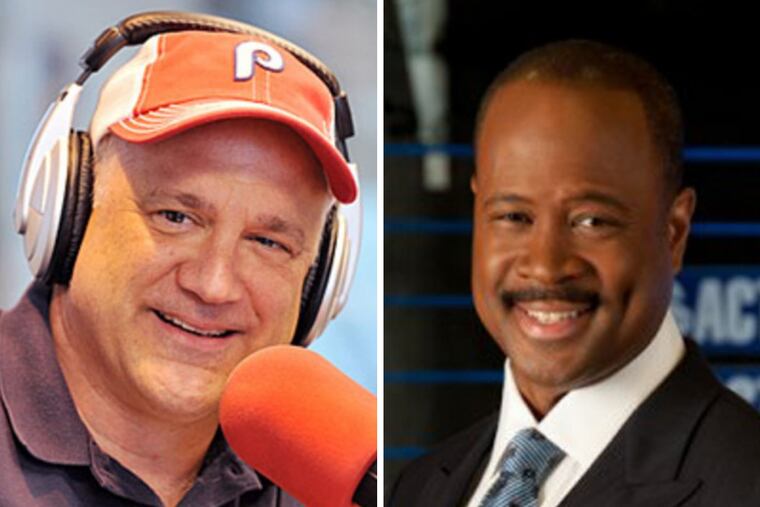Philly newscasters on their own mistakes: ‘People take it personally’ | Angry Grammarian
The most common gripe in the Angry Grammarian's inbox: “Why do newscasters make [fill-in-the-blank grammatical error] all the time?”

You people are obsessed with newscasters.
The most common gripe I receive from readers is: “Why do newscasters make [fill-in-the-blank grammatical error] all the time?” April 4 is National Hug a Newsperson Day, but in a pandemic, hugging isn’t a great idea. So I did the next best thing: I asked newscasters themselves why they are the overwhelming target of your ire.
“In Philadelphia in particular, people have a bond or an attachment to newscasters,” said Walt Hunter, who spent 36 years as an investigative reporter for CBS3. “When you make a mistake, people take it personally.”
“It’s the intimacy of audio,” said WHYY-FM Morning Edition host Jennifer Lynn. “You’re on the air, so you’re held to higher standards.”
“Our job as broadcast journalists is to be as factually and grammatically correct as possible,” said Rick Williams, for more than 25 years a 6ABC anchor and reporter.
According to Bob Bumbera, who anchors the news on WXPN’s Morning Show: “When we listen to someone deliver the news, we expect them to not just know what they’re talking about, but to say it in a proper way. The listener or viewer expects zero defects.”
Audiences are demanding, but even those viewers might not be aware of why.
“People have different perceptions of me as a journalist, and as a Black journalist,” said Williams. He recently met a fan in line at a veterinarian’s office, where he exchanged greetings with the man, who was white. After Williams left, his wife, who stayed behind, overheard the fan say to the receptionist, “Wow, that Rick Williams speaks just as proper in person as he does on TV. I always thought it was an act.”
“There’s a racial component,” recounted Williams. “Being a Black man, I also have a responsibility to speak as well as possible. There’s been this stereotype of Black Americans not being able to speak properly.”
Though most listeners and viewers save their complaints for my inbox, some target the broadcasters themselves.
“My 90-year-old father calls me on a regular basis to harangue me for improperly using me vs. I on the air,” said WIP talk-show host Glen Macnow, who also hosts the Eagles’ official pregame show. But Macnow understands the impulse. “People enjoy knowing they’re right when someone else is wrong.”
According to WHYY reporter P. Kenneth Burns, even amid the complaints, people’s motives are pure. “It comes from a good place where they want everything to be accurate, down to the phrase,” Burns said. “As news anchors, you have a lot of hubris to think that people want to listen to you.”
Lynn was similarly sanguine. “If and when I get a note like that, I always thank them for the insight, and I tell them that they’re part of the editorial process,” she said. “I don’t get annoyed. I don’t get incensed.”
Broadcasters are often the harshest critics of both themselves and their colleagues — but since they all live in glass houses, they mostly keep those criticisms to themselves. Bumbera gets irked when people use notorious as a synonym for famous. For Burns: over vs. more than. For Williams: ending a sentence with a preposition. For Hunter, it’s the meteorologists: “That storm did not ‘underperform’; you predicted it would do something it didn’t do. They’re not on Broadway.”
“I’m expecting it to be perfect,” said Bumbera. If they aren’t, audiences will continue to call them out.
“Jimmy Rollins won four Gold Gloves,” Macnow added. “He also made 154 errors in his career. I’m sure there are people who just remember the errors.”
The Angry Grammarian, otherwise known as Jeffrey Barg, looks at how language, grammar, and punctuation shape our world, and appears biweekly. Send comments, questions, and TKs to jeff@theangrygrammarian.com.
Read more from The Angry Grammarian
Don’t @ me: These new dictionary entries show how our language changed last year
Are you a covidiot who coronasplains?
I don’t know who needs to hear this, but you need to stop using these 13 phrases right now